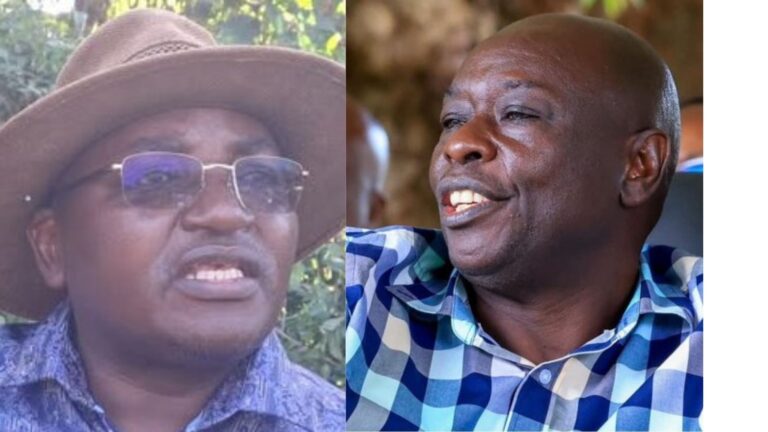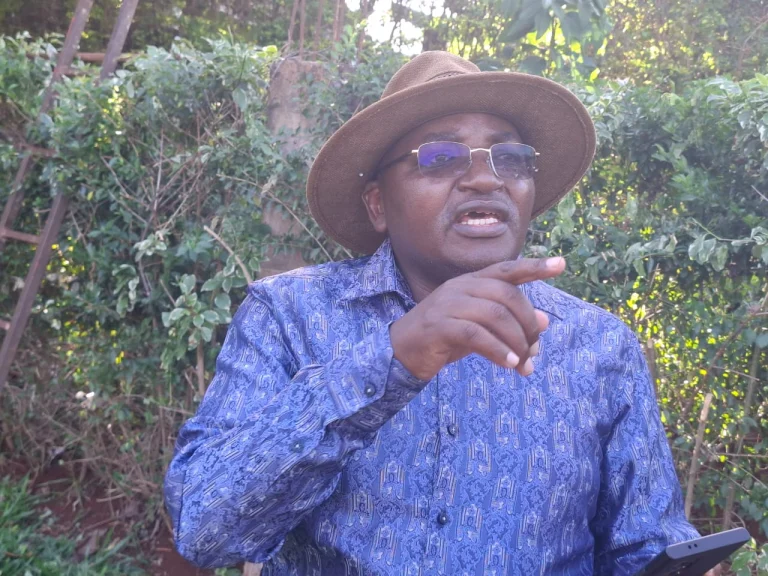
Kiharu legislator Ndindi Nyoro with his Embakasi East counterpart, Babu Owino. Photo/Handout
By Newsflash Team
Kiharu MP Ndindi Nyoro and Embakasi East MP Babu Owino have reportedly joined hands to form a new political party, the People’s Party of Kenya (PPK).
While the two youthful politicians have remained non-committal about the details, sources within their circles confirm they are laying the groundwork for a new political vehicle ahead of the 2027 general elections.
Their move signals a major shift in Kenya’s political landscape, as both leaders seek to capitalize on their growing influence among the youth and position themselves for future leadership roles.
Newsflash examines the factors that have pushed the two to take this bold step.
The Gen Z factor
One of the key drivers behind the formation of PPK is the Gen Z voting bloc, which reshaped Kenya’s political discourse during the 2023/2024 nationwide protests against unpopular government policies. Both Babu and Ndindi positioned themselves as champions of the youth, vocally opposing the Finance Bill 2024, which sparked mass demonstrations.
Read more: Babu at crossroads as Raila endorses Sakaja for Nairobi 2027 governorship race
“We cannot continue with politics as usual. The youth of this country have shown that they want leaders who understand them, who fight for their rights, and who are not tied to outdated political systems,” Babu told Newsflash.
Ndindi echoed the sentiment, stating, “The youth are the future, and we must build a political home that gives them a real voice. The traditional parties are no longer serving their aspirations.”
A push for generational change
Babu has previously drawn inspiration from Burkina Faso’s youthful leader, Ibrahim Traoré, and believes that Kenya is ripe for a generational shift. His meeting with Burkina Faso’s Foreign Affairs Minister Karamoko Jean-Marie Traoré last year reinforced his belief that younger leaders should take charge of Africa’s future.
“We have seen young leaders take charge elsewhere. Why not in Kenya? We cannot always be waiting for the same old faces to dictate our future,” Babu remarked during a recent political rally.
Political analyst Evans Ochieng agrees, stating, “Kenya is at a crossroads. The emergence of a younger leadership movement signals a shift in how political power will be contested in the coming years. If Babu and Ndindi successfully position themselves as the leaders of this movement, they could shake up the traditional political order.”
Betrayal and political survival
Both leaders have had strained relationships with their respective political parties.
Ndindi Nyoro, once seen as President William Ruto’s close ally, was unceremoniously removed as chair of the Budget and Appropriations Committee despite his active role in Ruto’s 2022 campaign. His sidelining within UDA has fueled speculation that he is looking for an independent political path.
“I have given my all, but I have also seen that politics is about self-preservation. You must build your own path if you want to truly serve your people,” Ndindi told a local radio station.
Read more: Why Ndindi Nyoro skipped Ruto’s State House meeting
On the other hand, Babu has faced hostility from close allies of ODM leader Raila Odinga, despite his immense popularity among ODM supporters. Some within ODM perceive him as a threat to Raila’s succession plan.
“I have been loyal to my party, but loyalty must be a two-way street. We must also create space for young leaders who can take our country forward,” Babu told Newsflash.
Community aspirations and future political plans
While Deputy President Rigathi Gachagua has established himself as a dominant force in Mt Kenya politics, Ndindi remains one of the region’s most popular leaders, particularly among the youth and business community. His national appeal surpasses Gachagua’s, positioning him as a key contender for future leadership.
“Ndindi is playing the long game. He knows that he may not win against Gachagua now, but by 2032, he will be a formidable force,” says political strategist Michael Mwangi.
Read more:Divisions emerge in Ruto camp over his planned Mt Kenya tour
For Babu, his ambitions extend beyond Parliament. He is widely expected to vie for the Nairobi gubernatorial seat in 2027, where he hopes to leverage his popularity among urban youth and Gen Z voters.
“In Nairobi, Kikuyu voters may rally behind Babu because of his partnership with Ndindi. At the same time, ODM supporters disenchanted with Governor Johnson Sakaja may also back him,” notes political analyst Prof. Ruth Wanjiru.
The bigger picture: Post-2032 politics
Beyond the immediate elections, Babu and Ndindi’s move is seen as a long-term strategy to create a new political platform for young leaders. Their goal is to build a party that will challenge the entrenched political dynasties and provide an alternative vision for Kenya’s future.
“We are not just forming a party for today. We are thinking ahead, building a political home that will accommodate the aspirations of young leaders post-2032,” Ndindi said during a recent town hall meeting.
Ochieng adds, “PPK could become the next major political force if it manages to attract and nurture young, charismatic leaders from across the country. The question is whether they can sustain the momentum and avoid the pitfalls that have plagued other new parties.”



